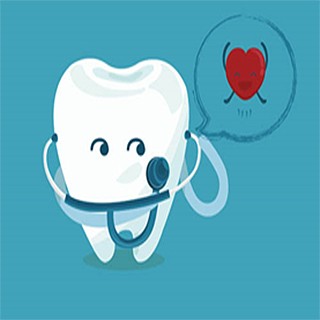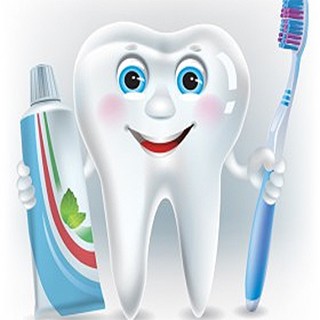Healthy Teeth, Healthy Smiles, Healthy Body
Healthy Teeth, Healthy Smiles, Healthy Body

When you were growing up, how many times did you hear the phrase “brush your teeth?” Parents are constantly reminding their children to brush their teeth and practice good dental habits. Good oral health includes taking care of your teeth, gums and tongue. When we do not practice good oral care we can develop problems such as bad breath, dry mouth, cold sores, thrush and tooth decay. Oral health is important because it has been linked to some diseases such as:
- Cardiovascular disease: Some research suggests that heart disease, clogged arteries and stroke might be linked to the infection/inflammation that oral bacteria can cause.
- Endocarditis: Endocarditis is an infection of the inner lining of the heart. It happens when bacteria from another part of the body, such as your mouth, spread through the blood and attach to damaged areas in the heart.
- Pregnancy: A gum infection that damages the soft tissue and destroys the bone that supports your teeth is called periodontitis. It has been linked to premature births and low birth weights.
- Diabetes: Gum disease occurs more frequently and is worse among people who have diabetes.
- Osteoporosis: It causes bones to become weak and brittle and might be linked to bone and tooth loss.
Nowadays dentists will examine babies’ teeth as young as 6 months, usually once they get their first tooth. As soon as teeth appear, decay can occur. It is advisable to begin cleaning your baby’s mouth during the first few days after birth by wiping the gums with a clean, moist gauze pad or washcloth.
Tooth decay or cavities occur when a tooth breaks down. Sugary drinks, sugary foods, and germs can cause tooth decay. Also, germs that cause cavities can be passed from one person to another via saliva. That is why it’s important for adults not to put the baby’s pacifier in their mouth, or share forks, spoons, cups or toothbrushes.
There are certain risk factors for getting cavities:
- Eating sugar frequently
- High acidic foods
- Being on the bottle too long
- Bad oral hygiene
- Bad fillings
- Not enough fluoride
- Dry mouth
- Eating disorders
- Drug abuse
- Braces
There are some things during the different life stages which you can do in order to help prevent tooth decay and preserve healthy teeth and gums:
Birth-12 months:
- You can wipe a baby’s mouth with a clean washcloth.
- Once first tooth is visible, brush with toothbrush and water.
12-24 months:
- Brush with a bit of infant toothpaste two times a day after breakfast and before bed.
2-5 years:
- Brush child’s teeth twice a day, after breakfast and before bed, with a pea-sized amount of tooth paste.
Adults:
- Brush twice a day with a toothpaste containing fluoride.
- Visit your dentist regularly for professional cleanings and examinations.
- Floss your teeth daily.
- Limit snacking.

Other important things you can keep in mind so you and your family have good oral health include:
- Taking your child to the dentist regularly.
- Not letting the baby go to bed with food or a bottle.
- Avoiding that your child snacks and drinks constantly between meals.
- Trying to wean your infant from the bottle to a sippy cup by the time they are 14 months.
- Never giving your baby/child juice in a bottle.
Foods To Help Prevent Tooth Decay:
- Calcium helps prevent tooth decay, and it is important especially for growing children. Dairy products are a great source of calcium with choices such as milk, yogurt and cheese. Also, leafy greens such as broccoli and bok choy, canned fish with bones, almonds, Brazil nuts and dried beans contain calcium.
- High-fiber foods keep saliva flowing, which helps create mineral defenses against tooth decay.
- Whole grains provide B vitamins and iron, which help keep gums healthy. Whole grains also have magnesium which is an important ingredient for bones and teeth.
FOODS THAT INCREASE CHANCE OF TOOTH DECAY:
- Snacks like cookies, cakes or other desserts are high in sugar.
- Sugary candies and sweets that stay in your mouth: If you eat sweets, choose those that clear out of your mouth quickly instead of the ones that are more likely to stick to your teeth.
- Refined carbohydrates: Chips, bread, and pasta are examples of refined carbohydrates. Starches made from white flour are simple carbohydrates and can remain in your mouth and then break down into simple sugars. Bacteria feed on these sugars and produce acid and this causes tooth decay.
- Carbonated soft drinks: Regular soda contain a high amount of sugar, and also contain phosphorous and carbonation, which wear away the enamel on your teeth. (This includes diet sodas).
- Fruit juice: Juice that is not 100 percent fruit juice usually contain a lot of sugar and sometimes acids that can damage teeth.
- Lemons, citrus fruits and other acidic foods cause erosion of teeth.


 TARRANT COUNTY, TX
TARRANT COUNTY, TX

 Chronic Disease Prevention
Chronic Disease Prevention